#Family Solicitors Harrow
Text
Divorce Lawyer & Family Solicitors in Harrow
Are you worried about what will happen after your divorce is finalized? Don't be - a qualified Divorce Lawyer Harrow can help make sure that everything goes smoothly. the harrow law firm has years of experience handling divorces, and our team of experienced attorneys will work diligently to ensure that every aspect of your legal process runs as smoothly as possible.
If you are in the midst of a divorce, Divorce Lawyer in Harrow is important to hire an experienced lawyer. Not only will he or she be able to help you navigate through the process smoothly and efficiently, but they may also be able to provide legal advice on other related issues.
We understand the stress and anxiety that comes with a divorce, and we want to do all we can to prevent any unpleasant surprises or conflicts. We'll take care of everything from filing paperwork through final court proceedings - so you can just relax and enjoy the peace and tranquility that comes with resolving your marital issues. Contact for more information at 7582932830 | http://www.aschfordslaw.com
#divorce lawyer harrow#divorce lawyer in harrow#family law harrow#family law harrow london#family solicitors harrow#gurkha immigration#immigration appeal lawyer uk#immigration lawyer harrow#probate solicitor harrow#sole representative visa uk#spouse visa#spouse visa ruislip#spouse visa uxbridge#uk business visa#uk immigration appeal#uk immigration appeal lawyer#uk immigration harrow#uk immigration harrow london#uk immigration harrow ruislip uxbridge#uk immigration lawyer#uk immigration lawyer harrow#uk immigration lawyer ruislip#uk immigration lawyer uxbridge#uk immigration uxbridge#uk work permit#wills and probate solicitor harrow#wills and probate solicitor harrow london#wills and probate solicitors london
1 note
·
View note
Text
Sole Representative Visa UK | Spouse Visa
Sole Representative Visa UK is the best way for business owners in the United Kingdom to get a visa that meets their specific needs. With Sole Representative Visa UK, you will have one individual who will handle all of your visa requirements for you – from preparing your application to ensuring that everything goes smoothly during processing. To find out more about our services or to make an appointment, please visit our website: https://www.aschfordslaw.com/representative-of-an-overseas-business/ or call us at (+44) 20 7604 6868.
#Divorce Lawyer Harrow#Family Law Harrow#Family Solicitors Harrow#Gurkha Immigration#Immigration Appeal Lawyer UK#Probate solicitor Harrow#Sole Representative Visa UK#Spouse Visa#Spouse Visa Uxbridge#UK immigration appeal#UK Immigration Harrow#Ruislip#Uxbridge#UK immigration lawyer#UK immigration lawyer Ruislip#UK Work Permit#UK Immigration Uxbridge#Wills and Probate solicitors London
0 notes
Text
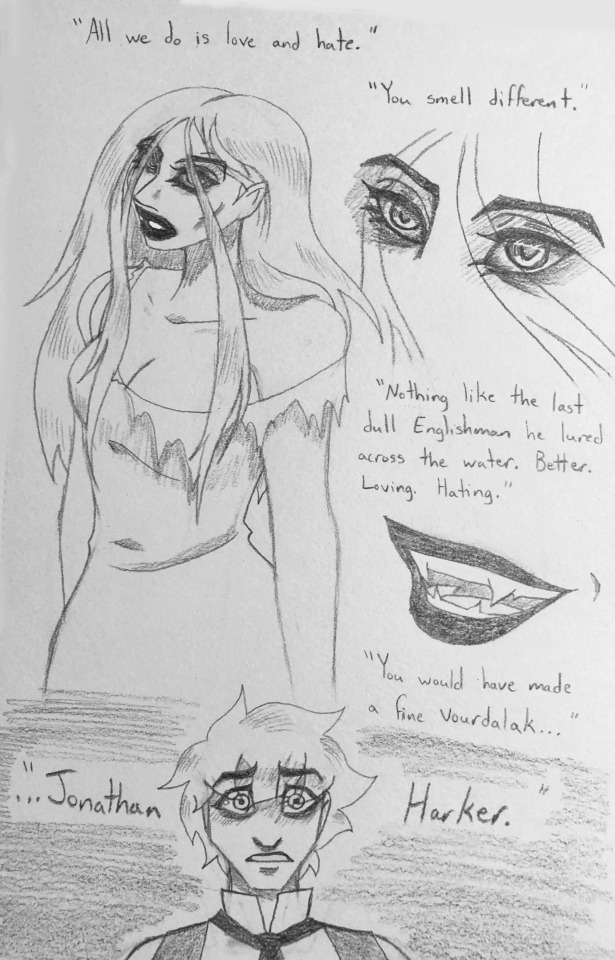
In which the young man in "Dracula's Guest" was a different Englishman who tragically did not live up to (and did not survive) Dracula's standards in a pet solicitor. Some time later, after a less harrowing Transylvanian visit, Mr. Harker happens by a certain dead village that the Count was wise enough to detour him from on that long-ago route to Borgo Pass. A certain lovely local is delighted to meet the meal/member who got away.
I just really want to see Countess Dolingen and her village get a little spotlight. The fact that they're all just there, sitting in one place without expanding their ground or hunting, is so intriguing to me. I made a post forever ago about how it'd be cool to discover they were a different vein of vampire, ala "The Family of the Vourdalak," which also featured a village of undead who collected loved ones, slaughtered those they didn't love, and did not leave their homeland's borders.
#Countess Dolingen and the Pretty Girl in Piccadilly and the Demeter's missing sailors and SO MANY other opportunities are just waiting#in the murk of the Dracula canon#waiting to be put to use#augh#dracula's guest#countess dolingen#dracula#jonathan harker#my art
130 notes
·
View notes
Text
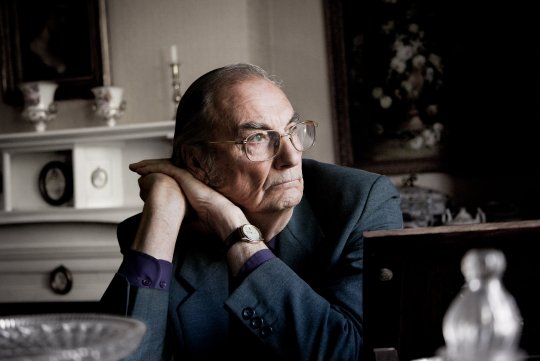
The much-quoted phrase “Grief is the price we pay for love” reached a global audience in 2001 when Queen Elizabeth II used it in her message of condolence to those affected by the 9/11 attacks in the US.
But it was the psychiatrist Colin Murray Parkes, who has died aged 95, who first came up with the words that have given solace to so many. In his 1972 book Bereavement: Studies of Grief in Adult Life, he wrote: “The pain of grief is just as much a part of life as the joy of love; it is, perhaps, the price we pay for love.”
When Parkes first proposed a research project on bereavement while working as a psychiatrist at the Maudsley hospital in south London in the 1960s, a professor responded: “What you have described isn’t a project, it’s a life’s work.” And so it proved.
Having noted that grief rarely featured in the indexes of the best-known psychiatry textbooks, he went on to write and co-author hundreds of research papers, and further books including Facing Death (1981); Death and Bereavement Across Cultures (1997); and Love and Loss: The Roots of Grief and Its Complications (2006). A selection of his works was published in 2015 as The Price of Love.
He was regularly called upon to provide assistance in the aftermath of large-scale disasters and admitted to finding this harrowing. Recalling his visit to Aberfan, the Welsh village near Merthyr Tydfil where a colliery waste tip collapsed on 21 October 1966, killing 116 children and 28 adults, he said: “The first time I drove away from the village I felt utterly helpless. Everyone I talked to had been desperate. I had to stop the car three times because I couldn’t carry on. I just needed to stop and cry.”
In April 1995 he was in Rwanda at the invitation of Unicef, who asked for his help in setting up a recovery programme following the previous year’s genocide there. He attended the reburial of 10,000 bodies that had been dug up from mass graves and felt haunted by his experiences in the country for the rest of his life.
After the terrorist attack on the World Trade Center in September 2001, in which 2,977 people died, Cruse – the bereavement charity of which Parkes was life president – was asked to send a team to New York to support the families of British victims. The biggest problem, he recalled, was making real to those families the unimaginable horror that their loved one was never going to come back. “Bereaved people can make it real, but it does take a long time. They have to go over it again and again, and think their way through it,” he said in an interview in the Independent shortly afterwards.
He also worked with those affected by the 1973 air crash near Basel, Switzerland, in which 108 died, mainly women from Axbridge, Somerset; the Bradford City stadium fire in 1985, in which 56 lost their lives; the Herald of Free Enterprise disaster in which 193 died after the ferry capsized near Zeebrugge, Belgium, in 1987; and the bomb explosion in a flight over Lockerbie, Scotland, in 1988 that killed 243 passengers, 16 crew and 11 residents. Parkes also travelled to India to assess the psychological needs of people bereaved by the 2004 Indian Ocean tsunami.
He said: “One of the most awful things about bereavement is that the world goes on as if nothing had happened. For bereaved people the world is never going to be the same again.”
Born in London, Colin was the son of Gwen (nee Roberts), and Eric Parkes, a solicitor. After attending Epsom college, in Surrey, he went to Westminster hospital medical school (now part of Imperial College London), qualifying as a doctor in 1951.
He worked for two years as a junior house physician at Westminster, then at Kettering general hospital in the Midlands. After two years’ national service with the RAF medical corps, he joined the Institute of Psychiatry, based at the Maudsley.
Following the publication of his research into bereavement in 1962, he joined the Tavistock Institute of Human Relations. There he worked with the psychologist John Bowlby for 13 years, disseminating the model of grief as consisting of four stages: numbness; pining; disorganisation and despair; and recovery.
Parkes was also instrumental in the introduction of bereavement services in hospices from the 1960s. He worked closely with Cicely Saunders – “the single-minded mother of palliative care with whom I shared angst at the scandalous ways our fellow doctors were treating patients faced with death and their families” – on the planning and launch of St Christopher’s hospice, Sydenham, in south London, in 1967.
Both were convinced that good care must involve families as well as patients. Parkes set up a bereavement service of trained volunteers who went into families’ homes and organised support groups, including some for staff, in the hospice. He remained involved with St Christopher’s until 2014, active as a consultant psychiatrist until 2007. He also performed this role at St Joseph’s hospice in Hackney, east London (1993-2007).
“He was a towering intellectual and hugely influential, but never took himself too seriously,” said the former chief executive of St Christopher’s Barbara Monroe. “He always remained a great clinician – very good at talking to patients and staff. And listening.”
In 1975 Parkes left the Tavistock to take up a senior lecturer role in psychiatry at Royal London hospital medical school, retiring from that post in 1993. His association with Cruse began in 1964, as a member of the council. He became chairman in 1972, and was made life president in 1992. Four years later he was appointed OBE.
Parkes edited the journal Bereavement from its launch in 1982 until 2019. Given the Times/Sternberg award – which celebrates the achievements of those over 70 – in 2012, when he was 84, he urged people to spend the last part of their lives in worthwhile work. “I was basically forced to retire at 65 and I got lots of cards with old men fishing on the front. But life is too short for retirement and the time has given me the opportunity to do things I would not otherwise have done,” he said.
In 1957 he married Patricia Ainsworth. She and their daughters, Liz, Jenny and Caz, survive him.
🔔 Colin Murray Parkes, psychiatrist and author, born 28 March 1928; died 13 January 2024
Daily inspiration. Discover more photos at Just for Books…?
8 notes
·
View notes
Text
'Where to start when profiling such a talented and charismatic actor as Andrew Scott? How about the fact that, aside from some youth theater workshop experience, this Dublin-born actor has had no official drama training? At 17, he was cast in a substantial role in an Irish film called Korea and, from there, joined the prestigious Abbey Theatre company in Dublin. His move to England in the late 80s corresponded with small parts in British, Irish, and American films and TV series and paved the way for his career to take off.
Among other projects, Andrew Scott appeared as an extra in Saving Private Ryan's Omaha Beach sequence, as well as several guest starring roles in British TV series like Garrow's Law and Foyle's War. All in all, he spent the first decade or so of his career building a solid body of work that would soon catapult him into pop culture stardom.
Let's take a look at some of Mr. Scott's iconic characters and lesser-known projects.
Sherlock (2010 – 2017)
Who can forget when Sherlock first revealed the character of Jim Moriarty to audiences in "The Great Game" episode? Scott played Mr. Holmes's famous nemesis as a deranged mastermind with a playful sing-song creepiness and a palpable presence of malice. He won the Best Supporting Actor TV BAFTA for that role in 2012.
The Bachelor Weekend aka The Stag (2013)
Some may have missed the delightful indie comedy, The Stag, about a group of friends who set out on a hiking excursion in the Irish countryside. Mr. Scott leads the ensemble as Davin, the groom's best man, in charge of their mild-mannered weekend. Their plans are wholly upended when The Machine (Peter McDonald), the bride's laddish brother, crashes the party. Lest you expect an Irish Hangover clone, emotional confrontations ensue between Davin and our groom, Fionnan (Hugh O'Conor), when unresolved issues from their past rise to the surface.
Pride (2014)
The feel-good, historical dramedy Pride depicts a group of London-based lesbian and gay activists who raised money to help families affected by the Welsh miners' strike in 1984. Scott plays Gethin, owner of a gay bookshop, who lends support to the group but hesitates to get actively involved due to his experiences as a gay youth coming out in Wales. He earned the best supporting actor trophy for his performance from the British Independent Film Awards.
Spectre (2015)
Once an actor is lauded for playing a baddie well, you have to expect the 007 franchise will come calling. In the 24th Bond film Spectre, Scott played Max Denbigh, aka C, Director-General of the Joint Security Service, an organization created by merging MI5 and MI6. While at first his disagreements with M (Ralph Fiennes) seem to be internal power struggles, it turns out C is a danger to democracy worldwide.
This Beautiful Fantastic (2016)
This Beautiful Fantastic is a quirky fairytale for adults and tells the story of Bella (Jessica Brown Findlay), a young woman who aspires to be a children's author but lacks the skills to navigate her out-of-control garden, let alone her nebulous career. Befriended by a kindly chef/housekeeper named Vernon (Scott), Bella begins to conquer her issues and blossom into the person she wishes to become. The film also stars Tom Wilkinson as Bella's gardening mentor.
Denial (2016)
A biographical legal drama, Denial depicts the libel case brought against American professor Deborah Lipstadt (Rachel Weisz) by Holocaust denier David Irving (Timothy Spall). Mr. Scott plays Anthony Julius, the lead solicitor of Deborah's legal team, who guides her through the UK justice system and their arduous path to obtaining justice.
1917 (2019)
In the innovative war drama 1917 (which starred a who's who of British talent), two English soldiers run a harrowing gauntlet through enemy territory to deliver a message that could save the lives of over 1500 troops. Along the way, the young men meet up with a handful of officers who help them on their journey, all played by respected British actors, including Messrs. Cumberbatch, Firth, Strong, and you guessed it – Scott. His portrayal of Lieutenant Leslie stands out a mile for its humor and hopelessness.
Present Laughing (2019)
Mr. Scott garnered theatrical acclaim for his performance as Garry Essendine in Present Laughing, a semi-autobiographical piece by Noel Coward performed at the Old Vic. Farcical in tone, the play depicts the harried life of a successful and self-obsessed light comedy actor facing an impending mid-life crisis. Andrew won the Laurence Olivier Award for Best Actor in a Leading Role in a Play.
Fleabag (2019)
Andrew Scott's name may have been synonymous with Moriarty until the world witnessed his portrayal of a character known only as "Hot Priest" in Fleabag. In the second season of Phoebe Waller-Bridge's award-winning dark comedy, Scott was introduced as the cleric who would be marrying Fleabag's dad and his fiancé. The couple has an immediate connection at the dinner table, and a trinity of friendship, spirituality and physical attraction ignite throughout the six-episode season. Scott's contribution was perfection!
This is only a brief sampling of Andrew Scott's work and impressive range...'
#Andrew Scott#Fleabag#Moriarty#Sherlock#BAFTA#Hot Priest#Phoebe Waller-Bridge#Olivier Award#Present Laughing#Benedict Cumberbatch#1917#Denial#Rachel Weisz#This Beautiful Fantastic#Jessica Brown Findlay#Pride#Garrow's Law#Foyle's War#Korea#“The Great Game”#Saving Private Ryan#The Bachelor Weekend#The Stag#Spectre#C#Max Denbigh
3 notes
·
View notes
Text
Signal Lost
I hope I can get this posted before I’m completely engulfed. It has taken two long years for me to bring all the pieces together so that I could begin to understand it myself. The radio that isn’t a radio….Tesla’s understanding of pure energy, and the signal…..Working in a rare bookshop in London was something I could do to find my reprieve from such a restless mind. Surrounded by endless knowledge quelled my need to pretend that the pointless ramblings of others around me actually held a pertinent place in my life. However, when one wishes to be forever lost in that particular kind of quest, in this case, me, one should remember what a harrowing process must be undertaken. “…mysterious phenomena, Professor, I yearn to know more of this wonderful force…” This is getting difficult….I hear him now without the radio…this signal.
I have always had a fascination for the workings of Nikola Tesla, and his theories about energy that seemed to offer limitless expanse for the mind to learn from. I have devoured many a biography about Tesla and his contributions to science, but I always felt that there was something addressing me from between the words on the pages. I have endured much harassment from others when I tried to explain this, but I felt that much of what happened to Tesla throughout his lifespan was deliberately omitted, not secretive necessarily, almost like an attempt to make peace with the man, and not agitate too much of the past. As my mum used to say: “kid gloves”.
I began that day like any other: sorting, filing and preparing for the new shipment to come in. Mr. Crampton always purchased items from defunct estate sales, or picked through the remnants of a sale he’d found in a newspaper advert. Not that I disapproved of his chosen methods, as they had yielded many profitable items. He would rarely attend auctions and the like, not wanting to squander a single copper on something that wouldn’t earn him some sort of satisfactory gain. I remember the shipment being late, and Mr. Crampton expecting me to remain in the shop late, without pay, however, Crampton offered me a biscuit for this night. I could go through the shipment boxes from the estate of a retired solicitor and if I agreed to get the merchandise properly unpacked and displayed before I took my leave, I could keep a few of the manuscripts I fancied, no queries, no limit. Crampton, scratched the back of his head and offered a smile before saying, “I know you like to poke about in books, this way both of us can profit, hey?” I nodded keenly, this offer was worth overlooking a few pounds in a pay packet.
“…Budapest Telephone Exchange…. chief electrician position…the improvements I have offered have assisted in business, why can I not publish the plans for my amplifier?” His thoughts are moving faster now, it is becoming difficult to concentrate. Over the next week I carefully inspected the items purchased by my boss, and diligently placed them for display, often staying at the shop until the wee hours of the morning. Most of the merchandise proved rather valuable, and a few Universities had made appointments to look over some of the volumes for their own libraries. I was disappointed, however, as most of the books were related to knowledge required of a solicitor, along with textbooks on the law, and other items of the like. Thankfully, or not, I am unsure, I unloaded the last box. I saw that it was half full of personal journals, dating back to the 1800’s. Some were fragile due to age, but each one was lovingly cared for, and it was obvious that these meant something to the family. After checking with Crampton, I was allowed to take home the entire carton, and luckily, the weekend was upon us, and I had three days to peruse the material. I still don’t know what called to me, there was more there than just pages in a journal, I wouldn’t know just how much more until I was well and truly into them.
“…losing the signal Wilson….damn Marconi, that cow liver of a thief….with this radio amplifier you can see…or rather hear the energy strings from the multiverse, as if there are universes upon universes trying to stitch themselves into each other…” I’m losing the signal, his deep-seated anger and feelings of betrayal are fraying the connection. I can barely remember now, the feeling of utter euphoria I felt as I plundered through the journals. However, the ones that put me on this platform had belonged to a man named David Wilson. He followed Tesla’s career closely, quietly rutting out frustrations every time Tesla’s efforts were thwarted or stolen, his main hatred fell on Guglielmo Marconi, the so-called father of the radio. Tesla felt through correspondence that this immigrant could help him further an invention that he had designed to pick up on energy waves that were unseen in the world around us, and hopefully find a way to convert this matter into a usable energy for the public at large. Unfortunately, instead of working with Tesla, he stole all design blueprints and personal notes in order to patent the device for himself. There was no questioning the suggested undertone Wilson offered that tied in Thomas Edison having a hand in the financing of this invention.
Wilson was not only impressed with the way Nikola Tesla’s mind unknotted these mysteries, he was enamored with the thought of finding a way to manipulate Tesla’s radio idea into a system that could actually reach out past the veil of death to learn secrets from those in different dimensions. Wilson even developed a machine that used Morse code to try and reach out. The machine worked. Even when disconnected from the telegraph line. Wilson offered to have other researchers examine his device, but what was not shared was that one of these men was a friend of Tesla, and Wilson made certain that the machine would be delivered to him immediately. Their communication went from sparse to constant in a matter of days. Nothing of Wilson’s device design remained. Now we fast forward to today, two years after my discovery.
The last of Wilson’s journals contained notes and rough draughts in Tesla’s own hand. They described in detail what was needed to improve and replicate a perfect combination of Wilson’s device, and Tesla’s updated radio amplifier. I am attaching the blueprints to this post. I tried to build this machine, and I followed every instruction. The more I built, the more my thoughts changed, no, not changed, magnified. At first, I only heard static in my head, perhaps a muffled word, then, as I progressed, the signals got clearer, I felt like my mind was channeling into different periods of Tesla’s life. I could feel his anger, satisfaction, sadness, and fatigue. He couldn’t turn it off…the racing thoughts, equations, designs…it is a feeling that overwhelms and comforts simultaneously. Now, the same thing is happening to me, but before I lose any more cognition I wanted to tell anyone who will listen: Tesla’s radio works, and it is truly incredible. “…told reporters at the event that, after thirty-five years of work, he was on the verge of producing proof of a new form of energy…. transmit individualized private radio wavelengths….allowing one’s mind to rest a while……”
Tesla created this device to ease himself of a restless mind, and still transfer that personal energy into a usable product that anyone could access. According to his notes, one device lasts 500 years, allowing generations of admittance to see new perspectives and make the world a better place. Unfortunately, I doubt Tesla took into account that most people do not think as expansively as he, and restlessness without reprieve could have dire consequences on a person. This is what I have tried to figure out a solution for…”alone in Room 3327 of the New Yorker Hotel… Alice Monaghan….my pigeon… to wish and call her and she would come flying to me… as a man loves a woman, and she loved me… there was a purpose to my life…so tired…” I have little time….I never did commit this to my own writing so I hope I can make sense of it here: the transference of energy can occur with the radio if it is set to…..”So tired….want to stop…signal lost signal lost signal lost signal lost….”
0 notes
Text
Cranston Inquiry Probes Channel Tragedy

A Comprehensive Probe into the November 2021 Channel Incident
The UK has embarked on a significant judicial process, the Cranston Inquiry, to thoroughly investigate the catastrophic Channel incident of November 24, 2021, which tragically claimed at least 27 lives. This independent, non-statutory inquiry, established on November 9, 2023, is a response to one of the most harrowing mass-casualty incidents in recent memory.
Sir Ross Cranston's Expert Leadership
Led by Sir Ross Cranston, a figure of legal distinction with a rich background in both the judicial and political arenas, the inquiry aims to unravel the complex circumstances leading up to this tragedy. Sir Ross, with his experience in the High Court’s Queen’s Bench Division and as a former Solicitor General for England and Wales, brings a depth of expertise crucial for the gravity of this investigation.
The Inquiry’s Scope and Aims
Exploring the Depth of the Tragedy
The Cranston Inquiry, with its terms of reference available in the libraries of both Houses, actively investigates this specific incident. Its primary goal is to uphold the rights of those affected and to ensure the inquiry listens to the voices of survivors and the families of the deceased. A key aspect of the inquiry involves examining the circumstances under which the deceased lost their lives and identifying lessons to prevent future incidents.
Collaboration with Existing Investigations
Sir Ross, in conducting this inquiry, will review the findings of the Marine Accident Investigation Branch (MAIB) regarding the incident. He aims to ensure a comprehensive and informed analysis by integrating these findings into the inquiry.
The Inquiry's Impact and Expectations
Providing Clarity and Recommendations
The Cranston Inquiry actively seeks to uncover the identities of the deceased and the circumstances of their deaths. It also aims to learn broader lessons from the events of November 24, 2021. The inquiry's goal is to provide recommendations that will help minimize the risk of similar events occurring in the future.
Announced by Transport Secretary Mark Harper
The inquiry's establishment was announced by Transport Secretary Mark Harper, following the MAIB report. Harper expressed his confidence in Sir Ross Cranston's ability to lead this inquiry with thoroughness and professionalism, emphasizing the importance of providing clarity to the families of the victims.
Cranston's Inquiry Approach
Ensuring Voices Are Heard
Sir Ross Cranston commits to conducting the inquiry in a way that ensures the survivors and family members of the deceased have their voices heard. His aim is to identify lessons to avoid similar tragedies and to deliver his report to the Secretary of State for Transport expeditiously. The inquiry will soon announce how it will proceed, marking a critical step in addressing this profound tragedy.
The Team Supporting the Inquiry
Rory Phillips KC of 3 Verulam Buildings (3VB) Chambers has been appointed as Counsel to the inquiry. Stephen Brown, Deputy Director in the government legal department, will serve as Solicitor to the inquiry, providing the necessary legal expertise to support this vital investigation.
Sir Ross Cranston: A Man of Many Roles
Multifaceted Legal and Political Career
Sir Ross Cranston, a professor of law at the London School of Economics and Political Science, has a distinguished career spanning the legal and political spheres. His tenure as a High Court Judge and his political role as MP for Dudley North and Solicitor General for England and Wales furnish him with a unique perspective for leading the inquiry.
Contributions Beyond the Inquiry
Sir Ross’s involvement extends beyond the UK, having served on missions for various international organizations and chaired significant legal reviews and committees. His extensive experience in the legal field, coupled with his global perspective, adds depth to the Cranston Inquiry.
Conclusion
The Cranston Inquiry represents a pivotal moment for the UK, as it seeks to confront and understand one of its most significant maritime tragedies. Under the experienced leadership of Sir Ross Cranston, the inquiry stands ready to provide insights and recommendations that could shape the future of maritime safety and policy.
As the nation awaits the findings, the inquiry stands as a testament to the UK's commitment to justice and the upholding of human rights.
Sources: THX News, Department for Transport & The Rt Hon Mark Harper MP.
Read the full article
#ChannelCrossingFatalities#CranstonInquiryChannelIncident#InquiryintoChannelDeaths#LegalReviewMaritimeTragedy#MarineAccidentInvestigationBranch#MaritimeIncidentInvestigation#November2021ChannelTragedy#SirRossCranstonLeadership#TransportSecretaryMarkHarper#UKMaritimeSafety
0 notes
Link
indian solicitors in uk
commercial property conveyancing hillingdon the partnership solicitors
#immigration solicitors in harrow#family property firm#immigration lawyers ruislip#personal injury lawyers ruislip#property lawyer ruislip
1 note
·
View note
Photo

FAMILY LAW SOLICITORS AT HARROW
Divorce Lawyers Harrow - Aston Brooke is one of the top family law solicitors in Harrow, London. We are the best expert lawyers in family matters including divorce and family disputes.
https://astonbrooke.co.uk/divorce-lawyers-family-law-solicitors-harrow-london
0 notes
Text
#2 Coffee et Advocacy
This week's entry I write inside my town's coffee house par excellence; Booths. Most days when I'm not at university in Manchester (Except Sundays, which are mercifully spent at practicing my music and at Church) I work shifts at a local restaurant to afford me to study law. Not that I don't have funds, but they are all too horrendously tied up in old assets. But it's honest work, and an excellent way to build interpersonal skills. A few people have asked me for advice as they start planning out their careers or seek to make a change, and my response unfortunately has to be the same as my (And probably, their) parents: "Get a job." At least when I say it I can surround those quotes in pretty UN badges and tie them up in a ribbon made from a Cambridge degree.
This past week has seen our class introduced to the areas of Criminal, EU, and, my favourite, Public law. Furthermore, this month will see a few of us engage in our first-ever advocacy competition- a Moot on a fictitious case regarding a woman charged with assault, and how we can either persuade the court to get her off it or put her away.
Seemingly modeled off of R v Wilson [1996] Crim LR 573, it brings up matters of consent, and loftier metanarratives of how those married are treated separately under the law regarding alleged crimes against their spouses.
My time spent gaining experience in a family law solicitor's office certainly brought up a great many reasons as to why marriage seems legally not the wisest of decisions. It ironically seemed that it should be illegal for anyone to hear the intimate details of something so harrowing as a divorce, which have to be discussed and dissected as though we were some kind of amoral surgeons- prying open the client's rent heart for all in the operating theatre to see. Having been like most young people, on both ends of some very hurtful romantic conclusions, the idea of undergoing a divorce seems unimaginable. My reading into contract law suggests that even toted safeguards against the worst effects of it - prenuptial agreements - have only just recently had any - limited - binding effect within English jurisdictions at all (Radmacher v Granatino 2010 [2010] UKSC 42).
The case of R v Wilson however, at least as far as the gory facts of the case are concerned, highlight that English judges have historically placed great stock, and great permissiveness, to actions which would otherwise lead assuredly to conviction so long as they are between two spouses (See R v Brown [1994] 1 AC 212). Many have claimed that this highlights systemic bias towards heteronormative relationships within the UK by the judiciary. I tend to agree that a bias does exist. However, the judiciary merely reflects the interest, and thus the culture and habitus, of the British Public, which always tends to change to match the latest trends in human rights be they from Berkely or Geneva. Our very placement within the European Court of Human Rights even safeguards us from not straying off the politically correct path to a certain degree, as reflected in A v UK [1998] 2 FLR 959, regarding the horror of the ECHR to the corporal punishment of children, deemed when reasonable as firmly within the Public Interest by English courts.
Following on from last week's mention of Rousseau, it is often through an examination of English case law that we can most clearly see instances of where the Public Interest of the UK has been deemed to lie, and where it may be lacking as a correct representation of post-modern values.
I could hardly, although I might be personally opposed to it, see the case for making extensive body modifications illegal, as reflected in the recent case of R v BM [2018] EWCA Crim 560. If a judge can decide a cosmetic body modification as serving no purpose either medically or within the Public Interest, then surely does not set a dangerous precedent as issues of transgenderism become more visible in the public consciousness? I fail to see how one could, if opposing one out of a concern for "Moral Values" (ECHR Article 8), not oppose the other, regardless of the growing medical corpus surrounding the latter. Even the implications on more the distant issue of transhumanism should be considered.
Regardless, the judiciary can only interpret and enforce the will of Parliament - It is to them all authority is derived, and where all calls for change should be targeted.
Already the law provides so many fascinating avenues for debate, and I can hardly wait to put my oratory into practice. As predicted, Law seems to allow for a great deal of creativity, whilst requiring meticulous attention to detail and a will to put yourself out there in front of a crowd.
Speaking of, I've also been made Class Ambassador, so my UN-followers can rest assured that I haven't ditched diplomacy entirely!
But that is for another entry
2 notes
·
View notes
Text
"We've Got Him!"
Monday 16th March 2020
Good evening folks! How are we all doing? How was your weekend? It's a brand new week and once again I have some #SPOILER news for you! I'm sure the majority of you have already heard by now, but EastEnders have revealed that Mick and Linda will be leaving ...... (Hold your breath! Not the soap!) .... the Queen Vic! Yes, it has been made known that Mick will be selling the Vic in an attempt to help support his wife overcoming her alcoholism. We know Linda is on the road to recovery, but obviously Mick feels living under in the legendary pub is only going to be harrowing reminder for Linda, best case scenario, get her away from temptation as soon as possible! So the question that will be on viewers lips will obviously be ... Who will be the new Landlord and Lady of the Queen Vic?! Now I've been thinking about this ... I know a few names have been thrown into the hat, but my thought strategy was ... Sharon?! Think about it ... She's currently homeless right now, she's been thrown out of the Mitchell house hold, after the revelation of Keanu being her baby father, she's currently living with Ian and Kathy as they have very kindly put her up until she's back on her feet, we know she's currently grieving for the death of her son, and she's due to make a heartbreaking decision ... what if it she gives up her new born son, then decides to make a new start for herself and return to the one place she felt safe, the place she spent her childhood, the place she used to call "Home" .... The Queen Vic! Plus of course Linda is best friend's with Sharon, she will trust her to make sure The Vic stays a running success! Who else could possibly come close?! To me, it seems like a no brainer, but then again ... I could be completely wrong! .... Who do you guys think should/could be the new Landlords of the Queen Vic?! I'd really love to hear your take this one!
Also, new pictures have been released of Phil's return, viewers will know that the last time we saw Phil, he was a passenger on a rescue boat, during the boat crash, and he watched from a far as young Dennis was pronounced dead. New pictures reveal that he will return to the Square on the day of Dennis's funeral wanting to speak to Sharon. Where has he been? And what has he got to say to her?!

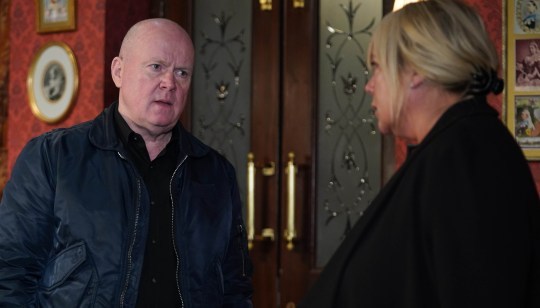
In other news, Shelley makes an appearance at The Vic, on the looks of things to cause a bit of trouble. Fans will know that Linda attempted to befriend Shelley outside the school gates of Ollie's school, but it soon turned sour as Shelley looked down on Linda! Will Linda now take a charge and stand up to Shelley?! Do you feel for Linda or do you think she kinda brought it on herself after the way she acted, due to her alcohol addiction?! I'd love to hear what you guys think!
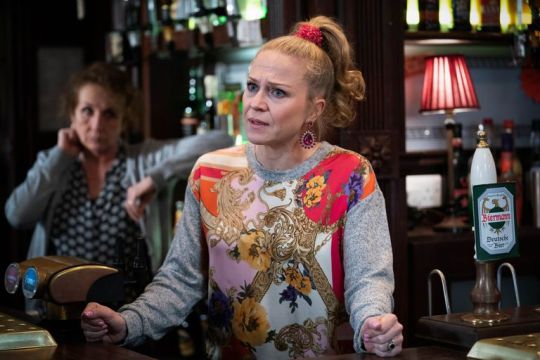
Now, tonight's episode ... ooooh so much to focus on, it seems a few of characters are struggling to move forward, to name mainly, Sharon and Keegan! Okay, so, let's start with Keegan ... I am feeling a little sorry for his character right now, I get he feels like people look at him in completely the wrong way due to the colour of his skin. He gets treated differently by the police, receptions and now solicitors. Is he ever going to get the loan he desperately needs to get his business off the ground? I'm starting to feel sorry for Tiffany too, as she's having to try and console Keegan as much as possible, and support him in the best way she can, being the doting wife, but for Keegan, it just isn't enough. He seems to think that Tiffany just doesn't understand, but I think she really is trying to. The conversation Keegan had with Denise, I found it very sweet. We haven't seen these two characters come together this way and share a very meaningful conversation. Denise clearly understands Keegan's frustration, I think it was nice for him to have someone there who actually gets it! With Denise being the same colour as Keegan, she's experienced exactly what he is currently going through and can shed some light on it for him I guess. I, personally, never released that (some) coloured people still suffer racial abuse, it's the 21st century, we should be well and truly passed this! I hope Keegan will try and move forward and eventually get some luck, he's been through a tough time and deserves to make something of his life!
Oh, so Ben is going to go ahead with the operation?! Let's hope to god it brings back his hearing, or at least helps to some extent. I don't believe he'll fully recover but I do believe he'll able to communicate a little better even if his hearing ability increases by just the smallest amount. I still think EastEnders are portraying this story-line brilliantly, still showing Ben hearing muffled sounds, it really puts it into perspective. Oh no! Danny's back! What could he want?! He knows what happened at the boat crash and he knows Phil is currently away ... what on earth could he be back on the square for?! I really hope Ben doesn't make a huge mistake and get involved in some dodgey deals because he basically couldn't understand what Danny was saying!! I think Danny obviously knew Ben had lost his hearing, otherwise he would never have shown his face, I think he's taking advantage here, Phil isn't around and Ben is vulnerable ... kinda makes the Mitchell clan look weak, and we all know that the Mitchell family has a history of hold up a reputation. I can see it now, Ben being dragged into a dodgey deal he can't get out of, Phil comes back while everything is going on and there'll be nothing he can do to help but try and get revenge on Danny .... what do you guys think could be in store for the Mitchell's now? And what do you think Danny could be back for?!
I just want to put it out there .... Max and Isaac?! Who thought of those two becoming pals?! I feel sorry for Patrick, the more we see of Isaac, it seems the more disappointed Patrick is of him. Would it make much difference if he knew he was his Dad? I'm not so sure, I think we'll see more anger coming from Isaac. Although, it was a really sweet gesture from Patrick to celebrate the life of Isaac's "Dad". Maybe this could be the turning point? Could Isaac now warm to Patrick? Guess we'll have to wait and see!
Awwww man, I just want to hug Sharon. She looks so run down and depressed and as if she's had no sleep at all! She looks a white as a sheet! I know I've said it before and yes, i'm going to say it again! She just doesn't want her new born son does she?! She had to be forced to go and register him, she asked Linda to bathe him for her and she got so upset over a twisted wheel on the pram. I get she's grieving, but Linda is right ... Kayden also needs his Mum! I can't see her carrying on to be honest, I still believe that she's going to give up her newborn, what else could her heartbreaking decision be? She's just too soaked up in grief, she can barely interact with anyone. I was beginning to wonder whether EastEnders will show Dennis's funeral, I mean it would be cruel not to I think, in the circumstances the character passed away. It would only be right to give Dennis a good send off, right? Or maybe it should be very quiet and very personal, what do you guys think? Can Sharon ever move on from this agonising grief?
Okay, time to focus on Chantelle and Gray. Did anyone else see the bruises on Chantelle's ribs left behind after the beating from Gray? I noticed that she was ignoring every word Gray was saying to her while she was doing the washing, Gray was doing all the talking and she didn't respond to a word he said, and yes, I hope that made Gray feel guilty, as he knew he'd done wrong! Poor Chantelle could barely move around the kitchen, I did fear that he was going to lose his temper with her again because she was ignoring him, but it seemed to do the trick, he clearly felt more and more guilty. The way she flinched as well before she left to go to her second job, she's visibly shaken and scared of him. But things could be looking up .... I was literally talking to the TV when Gray was in Whitney's bedroom "Look up! Look up!" and then when he saw it "Yes! Yes, Gray!" ... HE KNOWS LEO WAS IN THEIR ATTIC!!!!! Finally the break-through, literally, everyone has been waiting for! Gray can start to build a case and prove that Leo was stalking Whitney, Whitney will get to have her say in court and hopefully if they have enough evidence, Whitney will be free and Gray will be back at work! ..... Of course that may be false hope, this is EastEnders we're talking about, it is just a start anyway, I'm sure Gray has a long way to go to prove Leo was in Whitney's attic and also stalking her ... I've always said they need to find Whitney's diary ... what ever happened to that? Maybe it's long gone but even so, there still could be a twist and it still could be found?! Who knows? But hopefully, if things go well, Whitney will eventually get out of prison and Gray will be back at work, which may even stop him feeling completely under pressure and stop lashing out at Chantelle. This is of course wishful thinking, I have no idea what's going to happen next but, I feel, it's all looking positive! What do you guys think? Will Gray be able to save Whitney? How long will it be until the Taylor's find out about Chantelle's abuse?! Please leave me any theories or thoughts you may have to any of the current story-lines happening right now, I'd love to hear your input!
Thank you guys for your on-going support! I hope you guys enjoy reading my blog as much as I enjoy writing it! I'll be back again tomorrow for another blog, looking forward to seeing what happens next! Goodnight ya'll! xXx
2 notes
·
View notes
Text
Work Permit Requirements in the UK - Aschfordslaw
Starting your own business in the UK can be a daunting task, but with the help of Aschfordslaw, you'll have everything you need to get started. We offer UK Work Permit services for individuals who wish to visit the UK for business purposes, and our team of experts can guide you through the process.
Visit More Info Us: https://bit.ly/3SuiGqF
#UK Work Permit#Divorce Lawyer Harrow#Divorce Lawyer In Harrow#Family Law Harrow#Family Law Harrow London#Family Solicitors Harrow#Gurkha Immigration#Immigration Appeal Lawyer UK#Immigration lawyer Harrow#UK Immigration Uxbridge#UK immigration lawyer Ruislip#UK immigration lawyer#UK Business Visa#Spouse Visa Uxbridge
0 notes
Text
as it’s spooky season, friendly reminder that i have the following horror/supernatural related muses:
mircalla, countess karnstein | carmilla - AKA the lesbian vampire
baz grimm-pitch | carry on - AKA the gay vampire
dr. john “jack” seward | dracula - AKA the borderline mad scientist who’s really just trying his best
elizabeth lavenza frankenstein | frankenstein, w/ influences from kiersten white’s the dark descent of elizabeth frankenstein - AKA frankenstein’s fiancée who really didn’t deserve any of this nonsense
dorian gray | the picture of dorian gray - AKA the narcissistic trash can who ruins the lives of everyone around him & then thinks doing one sub-par good deed will be enough to make up for it
erik | the phantom of the opera - AKA the genius who’s gifted in practically everything except looks, love, & making moral choices
raoul, vicomte de chagny | the phantom of the opera - AKA the daring hero who risks his life to save the girl he loves from a masked stalker, but is somehow slept on by the majority of the fandom in favor of said masked stalker
isabella “bella” swan | twilight - AKA your average teenager who just so happens to attract danger like a magnet & has supernatural creatures for friends
arthur kipps | the woman in black - AKA the rational solicitor who gets stuck with the harrowing task of settling the affairs of a recently deceased woman whose house is haunted by a child-murdering ghost
hamlet, prince of denmark | hamlet - AKA the extremely dramatic prince with the extremely dysfunctional family who just can’t make his mind up about anything. also, there’s a ghost.
crowley | good omens - AKA the really shitty demon who’s best friends with a really shitty angel & has a car that really has a thing for queen.
#5/7 of them deserve the world#2/7 are morally reprehensible but i want them happy anyway#( probably listening to taylor swift ; kath )
9 notes
·
View notes
Text
Dr. Seward's Diary
I must have slept long and soundly, for it was broad daylight when Van Helsing waked me by coming into my room. He came over to my bedside and said:---
"You need not trouble about the knives; we shall not do it."
"Why not?" I asked. For his solemnity of the night before had greatly impressed me.
"Because," he said sternly, "it is too late -- or too early. See!" Here he held up the little golden crucifix. "This was stolen in the night."
"How, stolen," I asked in wonder, "since you have it now?"
"Because I get it back from the worthless wretch who stole it, from the woman who robbed the dead and the living. Her punishment will surely come, but not through me; she knew not altogether what she did and thus unknowing, she only stole. Now we must wait."
He went away on the word, leaving me with a new mystery to think of, a new puzzle to grapple with.
The forenoon was a dreary time, but at noon the solicitor came: Mr. Marquand, of Wholeman, Sons, Marquand & Lidderdale. He was very genial and very appreciative of what we had done, and took off our hands all cares as to details. During lunch he told us that Mrs. Westenra had for some time expected sudden death from her heart, and had put her affairs in absolute order; he informed us that, with the exception of a certain entailed property of Lucy's father's which now, in default of direct issue, went back to a distant branch of the family, the whole estate, real and personal, was left absolutely to Arthur Holmwood. When he had told us so much he went on:---
"Frankly we did our best to prevent such a testamentary disposition, and pointed out certain contingencies that might leave her daughter either penniless or not so free as she should be to act regarding a matrimonial alliance. Indeed, we pressed the matter so far that we almost came into collision, for she asked us if we were or were not prepared to carry out her wishes. Of course, we had then no alternative but to accept. We were right in principle, and ninety-nine times out of a hundred we should have proved, by the logic of events, the accuracy of our judgment. Frankly, however, I must admit that in this case any other form of disposition would have rendered impossible the carrying out of her wishes. For by her predeceasing her daughter the latter would have come into possession of the property, and, even had she only survived her mother by five minutes, her property would, in case there were no will -- and a will was a practical impossibility in such a case -- have been treated at her decease as under intestacy. In which case Lord Godalming, though so dear a friend, would have had no claim in the world; and the inheritors, being remote, would not be likely to abandon their just rights, for sentimental reasons regarding an entire stranger. I assure you, my dear sirs, I am rejoiced at the result, perfectly rejoiced."
He was a good fellow, but his rejoicing at the one little part -- in which he was officially interested -- of so great a tragedy, was an object-lesson in the limitations of sympathetic understanding.
He did not remain long, but said he would look in later in the day and see Lord Godalming. His coming, however, had been a certain comfort to us, since it assured us that we should not have to dread hostile criticism as to any of our acts. Arthur was expected at five o'clock, so a little before that time we visited the death-chamber. It was so in very truth, for now both mother and daughter lay in it. The undertaker, true to his craft, had made the best display he could of his goods, and there was a mortuary air about the place that lowered our spirits at once. Van Helsing ordered the former arrangement to be adhered to, explaining that, as Lord Godalming was coming very soon, it would be less harrowing to his feelings to see all that was left of his fiancée quite alone. The undertaker seemed shocked at his own stupidity and exerted himself to restore things to the condition in which we left them the night before, so that when Arthur came such shocks to his feelings as we could avoid were saved.
Poor fellow! He looked desperately sad and broken; even his stalwart manhood seemed to have shrunk somewhat under the strain of his much-tried emotions. He had, I knew, been very genuinely and devotedly attached to his father; and to lose him, and at such a time, was a bitter blow to him. With me he was warm as ever, and to Van Helsing he was sweetly courteous; but I could not help seeing that there was some constraint with him. The Professor noticed it, too, and motioned me to bring him upstairs. I did so, and left him at the door of the room, as I felt he would like to be quite alone with her, but he took my arm and led me in, saying huskily:---
"You loved her too, old fellow; she told me all about it, and there was no friend had a closer place in her heart than you. I don't know how to thank you for all you have done for her. I can't think yet..."
Here he suddenly broke down, and threw his arms round my shoulders and laid his head on my breast, crying:---
"Oh, Jack! Jack! What shall I do! The whole of life seems gone from me all at once, and there is nothing in the wide world for me to live for."
I comforted him as well as I could. In such cases men do not need much expression. A grip of the hand, the tightening of an arm over the shoulder, a sob in unison, are expressions of sympathy dear to a man's heart. I stood still and silent till his sobs died away, and then I said softly to him:---
"Come and look at her."
Together we moved over to the bed, and I lifted the lawn from her face. God! how beautiful she was. Every hour seemed to be enhancing her loveliness. It frightened and amazed me somewhat; and as for Arthur, he fell a-trembling, and finally was shaken with doubt as with an ague. At last, after a long pause, he said to me in a faint whisper:---
"Jack, is she really dead?"
I assured him sadly that it was so, and went on to suggest -- for I felt that such a horrible doubt should not have life for a moment longer than I could help -- that it often happened that after death faces became softened and even resolved into their youthful beauty; that this was especially so when death had been preceded by any acute or prolonged suffering. It seemed to quite do away with any doubt, and, after kneeling beside the couch for a while and looking at her lovingly and long, he turned aside. I told him that that must be good-bye, as the coffin had to be prepared; so he went back and took her dead hand in his and kissed it, and bent over and kissed her forehead. He came away, fondly looking back over his shoulder at her as he came.
I left him in the drawing-room, and told Van Helsing that he had said good-bye; so the latter went to the kitchen to tell the undertaker's men to proceed with the preparations and to screw up the coffin. When he came out of the room again I told him of Arthur's question, and he replied:---
"I am not surprised. Just now I doubted for a moment myself!"
We all dined together, and I could see that poor Art was trying to make the best of things. Van Helsing had been silent all dinner-time; but when we had lit our cigars he said --
"Lord -- -- "; but Arthur interrupted him:---
"No, no, not that, for God's sake! not yet at any rate. Forgive me, sir: I did not mean to speak offensively; it is only because my loss is so recent."
The Professor answered very sweetly:---
"I only used that name because I was in doubt. I must not call you 'Mr.,' and I have grown to love you -- yes, my dear boy, to love you -- as Arthur."
Arthur held out his hand, and took the old man's warmly.
"Call me what you will," he said. "I hope I may always have the title of a friend. And let me say that I am at a loss for words to thank you for your goodness to my poor dear." He paused a moment, and went on: "I know that she understood your goodness even better than I do; and if I was rude or in any way wanting at that time you acted so -- you remember" -- the Professor nodded -- "you must forgive me."
He answered with a grave kindness:---
"I know it was hard for you to quite trust me then, for to trust such violence needs to understand; and I take it that you do not -- that you cannot -- trust me now, for you do not yet understand. And there may be more times when I shall want you to trust when you cannot -- and may not -- and must not yet understand. But the time will come when your trust shall be whole and complete in me, and when you shall understand as though the sunlight himself shone through. Then you shall bless me from first to last for your own sake, and for the sake of others and for her dear sake to whom I swore to protect."
"And, indeed, indeed, sir," said Arthur warmly, "I shall in all ways trust you. I know and believe you have a very noble heart, and you are Jack's friend, and you were hers. You shall do what you like."
The Professor cleared his throat a couple of times, as though about to speak, and finally said:---
"May I ask you something now?"
"Certainly."
"You know that Mrs. Westenra left you all her property?"
"No, poor dear; I never thought of it."
"And as it is all yours, you have a right to deal with it as you will. I want you to give me permission to read all Miss Lucy's papers and letters. Believe me, it is no idle curiosity. I have a motive of which, be sure, she would have approved. I have them all here. I took them before we knew that all was yours, so that no strange hand might touch them -- no strange eye look through words into her soul. I shall keep them, if I may; even you may not see them yet, but I shall keep them safe. No word shall be lost; and in the good time I shall give them back to you. It's a hard thing I ask, but you will do it, will you not, for Lucy's sake?"
Arthur spoke out heartily, like his old self:---
"Dr. Van Helsing, you may do what you will. I feel that in saying this I am doing what my dear one would have approved. I shall not trouble you with questions till the time comes."
The old Professor stood up as he said solemnly:---
"And you are right. There will be pain for us all; but it will not be all pain, nor will this pain be the last. We and you too -- you most of all, my dear boy -- will have to pass through the bitter water before we reach the sweet. But we must be brave of heart and unselfish, and do our duty, and all will be well!"
I slept on a sofa in Arthur's room that night. Van Helsing did not go to bed at all. He went to and fro, as if patrolling the house, and was never out of sight of the room where Lucy lay in her coffin, strewn with the wild garlic flowers, which sent, through the odour of lily and rose, a heavy, overpowering smell into the night.
2 notes
·
View notes
Photo
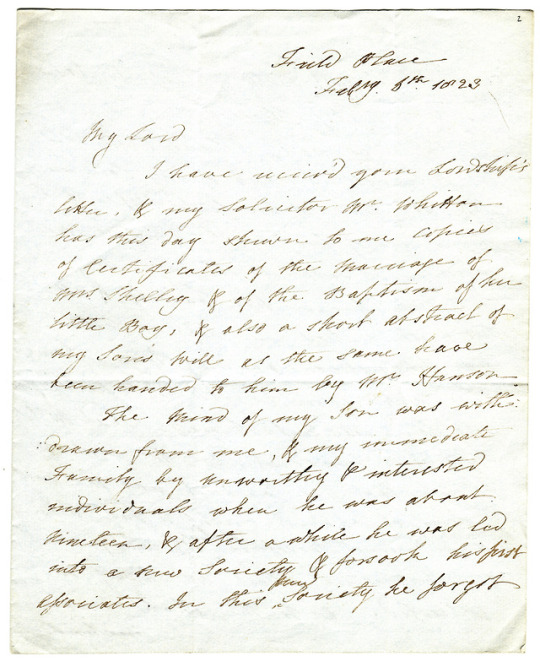
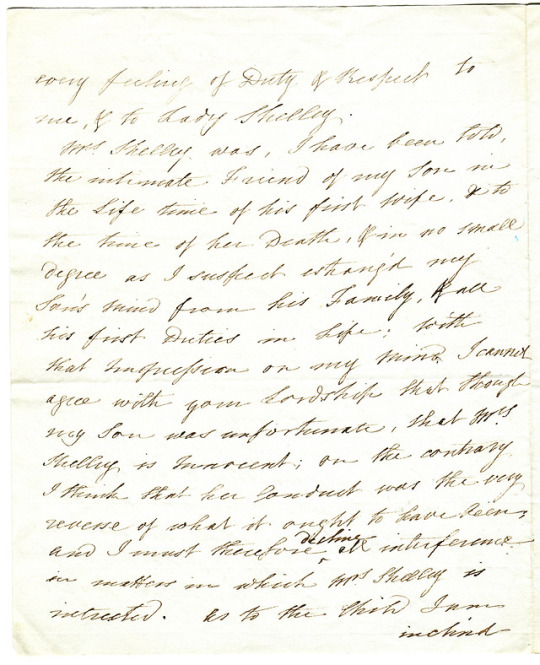
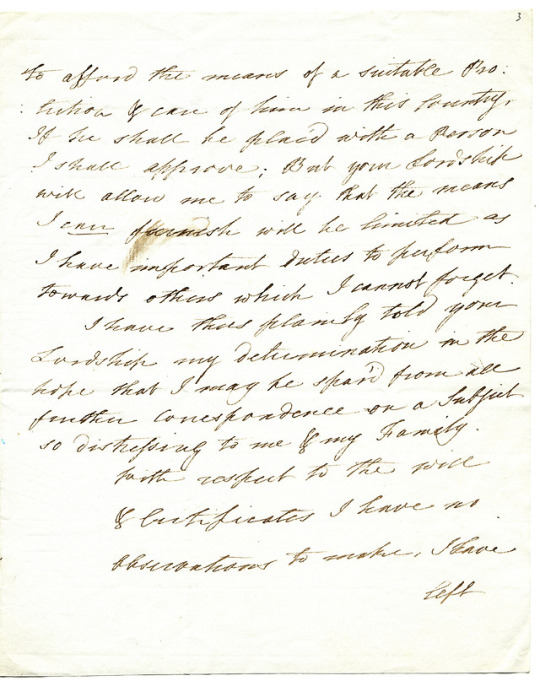
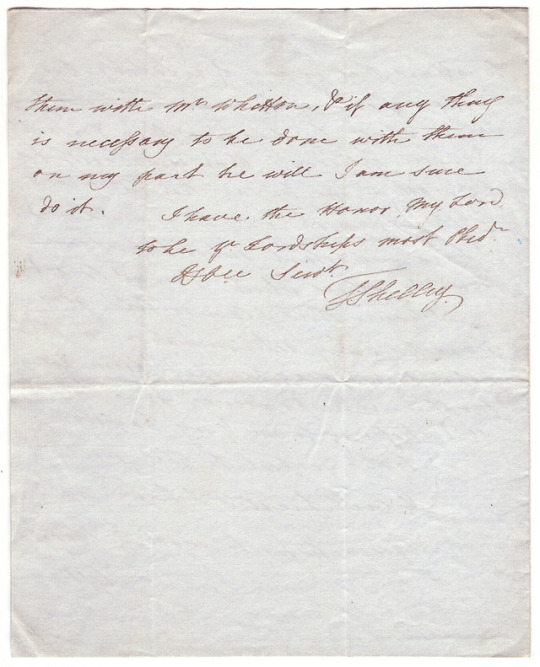
A letter from Percy Shelley's father refusing to help Mary Shelley
An excerpt –
“Mrs. Shelley was, I have been told, the intimate Friend of my Son in the Life time of his first Wife, & to the time of her Death, & in no small degree as I suspect estrang'd my Son's mind from his Family, & all his first Duties in Life; with that transgression on my Mind, I cannot agree with your Lordship that though my Son was unfortunate, that Mrs. Shelley is innocent; on the contrary I think that her Conduct was the very reverse of what it ought to have been, and I must therefore decline/ all interference in matters in which Mrs. Shelley is intrested. As to the Child I am inclin[e]d to afford the means of a suitable Protection & care of him in this Country, if he shall be plac'd with a Person I shall approve; But your Lordship will allow me to say that the means I can furnish will be limited as I have important duties to perform towards others which I cannot forget. I have thus plainly told your Lordship my determination in the hope that I may be spar'd from all further correspondence on a Subject so distressing to me & my Family.”
After Shelley’s death Mary was forced to ask Sir Timothy Shelley, the father-in-law she had never met, for financial assistance. She used Byron as an intermediary, and the letter here is Sir Timothy’s unequivocal response. As far as he was concerned, his son had forgotten his ‘first Duties in life', and Mary was one of those ‘unworthy & interested individuals' who had estranged him from his parents. He declined to help her in any way, although he did grudgingly agree to provide some support for her son, Percy Florence, provided he returned to England and was placed in the hands of a guardian (to be appointed by himself).
Sir Timothy's stipulation that Percy Florence be educated in England was a principal factor in Mary Shelley's decision to leave Italy in August 1823. She refused to hand her son over to a guardian, however, and for the next twenty years was obliged to communicate regularly with 'Sir Tim', always through his solicitors, in order to obtain funds for Percy's education at Harrow and Cambridge. And she lived in constant anxiety that Sir Timothy would take offence at something she did, and withdraw the allowance (see Mary Shelley, Editor).
On Christmas Day 1821 Shelley and Byron had made a wager of £1,000: who would die first, Sir Timothy Shelley or Lady Noel, Byron's mother-in-law? When Lady Noel died in the new year Shelley won the bet (although Byron refused to pay up), and Sir Timothy would in fact live for another twenty-two years. He finally died in 1844, aged ninety. Shelley's eldest son by Harriet, Charles, had died in 1826, so Percy Florence inherited the baronetcy and the entailed part of the estate. When writing in 1823, however, Sir Timothy must still have regarded Charles, not Percy Florence, as his heir.
Source
#mary shelley#percy bysshe shelley#english literature#english romanticism#romanticism#Romantic Poetry
9 notes
·
View notes
Text
Vindication for victims of Deepcut violence
As well as vindication of his family's 23 year campaign, the second inquest into the death of Sean Benton provided a last chance for other recruits who suffered under the toxic regime at Deepcut in the mid 1990s to have their harrowing stories heard and believed.
Despite claims of reporting bias, press sensationalism and social media hysteria, His Honour Judge Peter Rook QC found many of the witnesses who gave evidence at the inquest had been truthful.
Bullying and intimidation featured heavily in re-examination of the deaths of Cheryl James and Sean Benton who died within months of each other in 1995.
The next two young soldiers to die were years later when personnel at Deepcut had completely changed.
His inquest established Sean Benton was physically and verbally assaulted by the man directly responsible for his welfare.
Witnesses who appeared at both inquests were ridiculed, accused of embellishing their disturbing accounts of life in the camp and the press blamed for demonising Andrew Gavaghan.
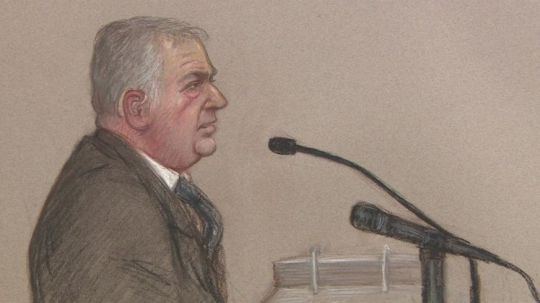
Sgt Andrew Gavaghan in the witness box at the second Cheryl James inquest
Again and again, the court room at Woking heard stories of teenage boys and girls attacked physically and verbally by the man whose job it was to look after them.
Witness testimonies in the Sean Benton hearings confirmed levels of violence and intimidation at Deepcut only hinted at during the second inquest for Cheryl James.
Perfect Storm
The wider scope agreed for Benton allowed for an examination of the culture at Deepcut before and after his death.
A perfect storm of inadequacy and toxicity which few were willing to take responsibility for is how the regime was described over more than 40 court days with Andrew Gavaghan always at the centre.
The coroner concluded he physically assaulted at least ten other trainees during his time as a Deepcut troop sergeant.
Everybody who spent any time there or had even heard of Deepcut in the 1990s knew his name.
His evil twin brother routine had become army legend.
A legend which he promoted, the coroner said.
“Having heard the witnesses’ accounts and noted similarity with other accounts I am satisfied on the balance of probabilities that Sgt Gavaghan did punch and kick some trainees,” the coroner said.
Sgt Gavaghan was prepared to use physical violence as unrecorded punishment for minor misdemeanours as a form of summary justice, Judge Rook said.
He further described Sgt Gavaghan’s willingness to abuse his authority with kicks, jabs from his fist or pushes with his pace stick.
Believed
Witness after witness described in detail their terror of a man who could turn in the blink of an eye from your best friend to a raving lunatic with untouchable authority and control over them.
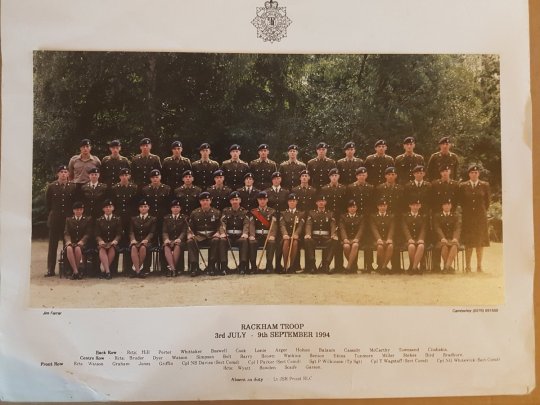
Rackham Troop passing out photograph
Pte Clair Hirstwood, Pte Stan Munday, Pte Theresa Burrows, Pte Rhiannon Wells, Pte Catherine Roberts, Pte Thomas Rowlands, Pte Trevor Hunter, Pte Daniel Griffiths, Pte Claire Knowles, Pte Robert Gasson, Pte Glyn Boswell, Pte Victoria McKinlay and Pte Claire Dilkes were all believed by the coroner.
Deepcut NCOs dominated the lives of trainees.
The same people they were supposed to look to him for help if they needed it.
During Sean’s inquest, Paul Greaney QC for his family made the point with each witness.
Who else could they go to?
His Honour Judge Rook told Sean’s remaining family despite recording the same verdict as his first inadequate inquest, their 23 year campaign had been worthwhile.
For the witnesses who relived their days at Deepcut in the witness box at Woking, at times through tears, his conclusions were just as important.
More are still coming forward to add their chapters to the catalogue of misery.
There was no welfare provision at Deepcut.
Hundreds of teenage soldiers were left unsupervised with access to drink and guns.
NCOs used excessive and repetitive punishments which went beyond legitimate sanctions, the coroner said.
Criminal
Liberty, the human rights lawyers who acted for the Benton family, have called for civilian police to investigate all military crimes following the conclusion of Sean’s inquest.
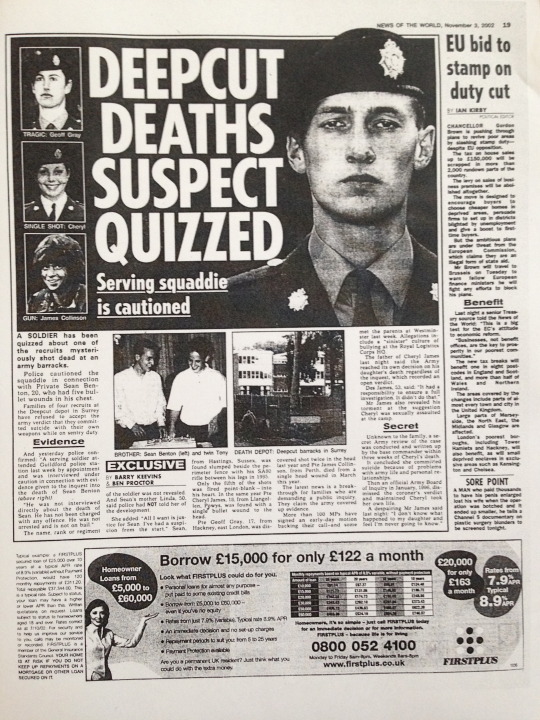
News of the World, November 3, 2002
Emma Norton, Head of Legal Casework at Liberty and solicitor for the Benton family, said: “Private Sean Benton was routinely attacked and humiliated at Deepcut barracks.
"He had nowhere to turn for help, and his mental health fell apart.
“Myth-busting recruitment campaigns might claim things are different now – but we still see soldiers failed by a closed-ranks military culture that resents outside oversight.
“When soldiers are assaulted or face sexual violence at work, the Army must guarantee civilian police will investigate those crimes.
"The men and women who fight for our country deserve equal justice.”
Geoff Gray and James Collinson were shot dead at the same camp years later in similar though unconnected circumstances.
Pte Gray’s will be the third of the new inquests with hopes of James Collinson to follow.
1 note
·
View note